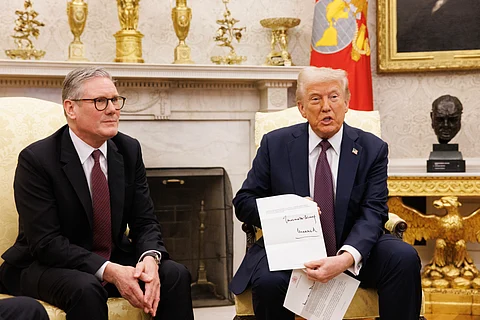

U.S. President Donald Trump announced on Monday that he is drastically shortening the 50-day ultimatum he had previously issued to Russian President Vladimir Putin, reducing it to just "10 or 12 days." The ultimatum, originally issued on July 7th, called for Putin to agree to a ceasefire in Ukraine or face unprecedented secondary sanctions. Trump’s updated timeline now moves the deadline from early September to mid-August.
Speaking at one of his golf courses in Scotland after a meeting with newly elected U.K. Prime Minister Keir Starmer, Trump explained the change in tone and timeline, citing a lack of progress in peace efforts.
“I gave him 50 days, but I’m going to cut that down to 10 or 12 days starting today. We’re going to make that official by Tuesday,” Trump said. “Putin hasn’t done enough, and I’m not seeing the progress we need on peace. If he doesn’t come to the table, we’ll hit Russia with sanctions like they’ve never seen before, and the secondary tariffs will be no joke.”
These proposed secondary sanctions would target nations purchasing Russian energy, including China and India, with tariffs possibly reaching 100%.
Trump also reiterated his personal disappointment in Putin, stating, “I’m disappointed in President Putin. I thought he was somebody that meant what he said. And he’ll talk so beautifully, and then he’ll bomb people at night. We don’t like that.”
Analysts suggest that Trump’s sudden shift may have been influenced by his meeting with Starmer, who holds a notably hawkish stance toward Russia. Trump has frequently been observed tailoring his public remarks based on recent conversations, and Starmer likely pushed for a tougher position during their discussions.
The announcement comes at a precarious moment in U.S.-China relations. On Monday, American and Chinese delegations met in Sweden to negotiate an extension of the 90-day tariff pause set to expire in mid-August. Imposing sweeping new tariffs on China for its continued purchases of Russian energy could derail those talks entirely, potentially reigniting the trade war between Washington and Beijing that the Trump administration had only recently de-escalated in May.